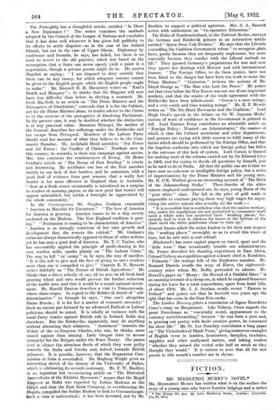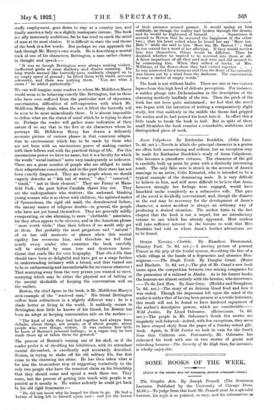FICTION.
MR. MIDDLETON MURRY'S NOVEL.* Ma. MIDDLETON MURRY has written what is on the surface the story of a young man who leaves London lodgings and a rather • Ths Things We Are. By John Middleton Mum-. London : Conetable. rie, ed. net.1 -stuffy employment, goes down to stay at a country inn, and finally marries a lady on a slightly inadequate income. The book is / ;ally immensely ambitious, fer he has tried to catch the mind of man at its most elusive. It is difficult to state the real theme
of the book in a few words. But perhaps we can approach the task through Mr. Murry's own words. He is describing a mental trick of one of his characters, Bettington, a man rather clumsy in thought and speech:
" It was as though Bettington were always making violent, ineffectual grabs at some shadowy and elusive meaning. His long words seemed like butterfly-nets, suddenly clapped on to an empty space of ground ; he lifted them with timid, nervous solemnity, and there was nothing there. You see what I mean Y ' he added pathetically."
We can well imagine some readers to whom Mr. MiddletonMurry Would seem to be behaving exactly like Bettington, but to those
who have ever suffered from the particular sort of shynesses, uncertainties, difficulties of self-expression with which Mr.
Middleton Murry deals, when the net is lifted the butterfly will be seen to be most miraculously there. It is almost impossible to define what are the states of mind which he is trying to show us. Perhaps the reader will gather some indication of their nature if we say that in the five or six characters whom he portrays Mr. Middleton Murry has drawn a delicately accurate picture of various phases in that conscious adapta- tion to environment which has to be made by those who are not born with an unconscious power of making contact with their fellows and with the practical things of life. For this unconscious power we have no name, but it is a faculty for which the words " social instinct" serve very inadequately as indicator. There are a great number of people who are obliged to make their adaptations consciously, and in the past their state has not been exactly diagnosed. They are the people whom we should vaguely describe as " fish out of water," " shy," " reserved," " timid," " not in their element." They are Fanny at Mans- field Park ; the poet before Candida thaws him out. They are the undergraduate who stutters ; the awkward, blushing young woman who is so clever with children; the agitated maker of Spoonerisms, the rigid old maid, the downhearted failure, the uneasy nurser of religious doubts—in general, the people who have not yet found themselves. They arc generally mildly exasperating, or else alarming, to more " clubbable " associates, for they often appear to be cleverer, and in the American phrase " more worth while," than their fellows if we sould only get at them. But probably the most gregarious and " natural " of us has odd moments or phases when this mental rigidity has overcome him, and therefore we feel that nearly every reader who examines the book carefully will be startled by some true and dexterous home-
thrust that reads like his own biography. That Mte-is-Mte that should have been so delightful and have got us a stage further in understanding intimacy with a friend, and that turned out
to be so embarrassing and uncomfortable for no reason whatever I That scurrying away from the very person you wanted to meet, scurrying which may be either the physical act of bolting or the mental skedaddle of keeping the conversation well on the surface.
Boston, the chief figure in the book, is Mr. Middleton Murry's arch-example of the " reserved man." His friend Bettington suffers from solitariness in a slightly different way ; he is a shade better at living in the world. It suddenly occurs to Bettington how little he knows of his friend, for Boston has been an adept at keeping conversation safe on the surface :—
" The kind of talk they had had together had always been definite, about things, not people, or if about people, about people who were things, writers. It was curious how little he knew of Boston's personal feelings ; in a vague way he had made them up or taken them for granted."
The process of Boston's coming out of his shell, or if the reader prefer it of shedding his inhibitions, with its attendant mental discomfort, is excellently and accurately described. Boston, in trying to shake off his old solitary life, has first come to the charming inn alone. He has then taken what is for him the tremendous step of suggesting tentatively to the only two people who have the remotest claim on his friendship that they should come and spend a week there too. They
come, but the process of getting into touch with people is as painful, as it usually is. He wishes ardently he could get back
to his old rigid frozeruiess
He did net knory why he longed for thorn to go. He had a horror of being left to himself again now ; and yet the horror
of their presence seemed greater. It would spring on him suddenly, as though the reality had broken through the dream, and he would be frightened of himself.. . . Sometimes it seemed to Boston that ho resented the happiness of the other two ; that his heart ached when he heard her say ' More tea, Bett ? ' while she said to him Moro tea, Mr. Boston ? ' ; that he too craved for a word of her affection. If they would receive him into themselves, things would be different. Then he doubted whether ho wanted to be received into them at all. A fierce impatience of all they said and were and did seemed to be consuming him. When they talked of books, of Mrs. Williams, of the flower-show they had visited together . . . he was interested for a moment and then the flame of his curiosity was blown out by a wind from the darkness. The conversation became a clatter of empty words."
The book is not without faults. There are one or two curious lapses from this high level of delicate perception. For instance, a sudden plunge into Dickensianism in the description of the charming motherly landlady of the inn. Then the pitch of the book has not been quite maintained ; we feel that the novel was begun with the intention of writing a comparatively slight study, but that suddenly in the middle the theme had gripped the author and ho had poured his heart into it. In effect this a little tends to break the book in half. But in spite of these small blemishes the book remains a remarkable, ambitious, and distinguished piece of work.



































 Previous page
Previous page